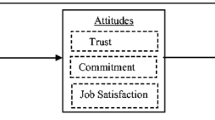Abstract
This study examines the relationship between some facets of organizational climate in university departments and faculty attitudes toward various aspects of faculty unionization. The dimensions of organizational climate explored are: the perceived power structure, assessment of rewards, and perceived organizational goals. The major findings of this study are: (a) The perceived power structure is an important determinant of attitudes toward an egalitarian system, especially in the social sciences. Perceived individual power is negatively related to egalitarian attitude in the physical sciences whereas perceived faculty group power is negatively related to favorable attitudes toward collective bargaining in the social sciences. (b) Perceived emphasis on consulting activities is positively related to attitudes toward seniority-based aspects of collective bargaining in the physical sciences while perceived emphasis on personal factors is positively related to all aspects of attitude toward collective bargaining in the social sciences. (c) Inequity is positively related to attitudes toward unionization both in the physical and social sciences. The policy implications of these findings to faculty and university administration are discussed.
Similar content being viewed by others
References
Beyer, J. M., and Lodahl, T. M. A comparative study of patterns of influence in United States and English universities.Administrative Science Quarterly 1976,21 104–129.
Blau, P. M.Exchange and power in social life. New York: Wiley, 1964.
Campbell, J. P., Dunnette, M. D., Lawler, E. E. III, and Weick, K. E., Jr.Managerial behavior, performance and effectiveness. New York: McGraw-Hill, 1970.
Duryea, E. D., and Fisk, R. S.Faculty unions and collective bargaining. San Francisco: Jossey-Bass, 1973.
Gress, J. R., Predicting faculty attitude toward collective bargaining.Research In Higher Education 1976,4 247–256.
Hellriegel, D., and Slocum, J. W., Jr., Organizational climate: measures, research and contingencies.Academy of Management Journal 1974,17 255–280.
Kemerer, F. R., and Baldridge, J. V.Unions on Campus. San Francisco: Jossey-Bass, 1975.
Kerr, C.The Uses of the University. New York: Harper & Row, 1972.
Lodahl, J. B., and Gordon, G. The structure of scientific fields and the functioning of university graduate departments.American Sociological Review 1972,37 57–72.
Lodahl, J.B., and Gordon, G. Differences between physical and social sciences in university graduate departments.Research In Higher Education 1973,1 191–213.
Ladd, E. C., Jr., and Lipset, S. M. “The Growth of Faculty Unions.”Chronicle of Higher Education, 1976,11(2).
Lewis, L. S., and Ryan, M. N. The American professoriate and the movement toward unionization.Higher Education 1977,6 139–164.
Litwin, G., and Stringer, R.Motivation and organizational climate. Cambridge, MA: Harvard University Press, 1968.
Lozier, G. G., and Mortimer, K. P. A collective bargaining election: issues and faculty voting behavior.Research In Higher Education 1976,4 193–208.
Neumann, Y. Predicting faculty success in university graduate departments.Research In Higher Education 1977,6 275–287.
Perrow, C. Goals in complex organizations.American Sociological Review 1961, 26, 854–865.
Pritchard, R., and Karasick, B. The effects of organizational climate on managerial job performance and job satisfaction.Organizational Behavior and Human Performance 1973,9 110–119.
Roose, K. D., and Andersen, C. J.A rating of graduate programs Washington, DC: American Council on Education, 1970.
Runciman, W. G.Relative deprivation and social justice. Berkeley, CA: The University of California Press, 1966.
Schneider, B. Organizational climate: individual preferences and organizational realities.Journal of Applied Psychology 1972,56 211–218.
Semas, P. W. “Faculty Unions Add 60 Campuses in 1975–76 Academic Year.”Chronicle of Higher Education 1976,12 5.
Shulman, C. H.Collective bargaining on campus. Washington, DC: American Association for Higher Education, 1972.
Thibaut, J. M., and Kelley, H. H.The social psychology of groups. New York: Wiley, 1959.
Tice, T. N.Faculty Bargaining in Seventies. Ann Arbor, Mich.: The Institute of Continuing Legal Education, 1973.
Weick, K. E. The concept of equity in the perception of pay.Administrative Science Quarterly 1966,11 414–434.
Wilkes, J.Cognitive and research style in paradigm and preparadigm sciences. Unpublished Ph.D. dissertation. Ithaca, NY: Cornell University, 1976.
Author information
Authors and Affiliations
Rights and permissions
About this article
Cite this article
Neumann, Y. Determinants of faculty attitudes toward collective bargaining in university graduate departments: An organizational climate approach. Res High Educ 10, 123–138 (1979). https://doi.org/10.1007/BF00976225
Issue Date:
DOI: https://doi.org/10.1007/BF00976225




